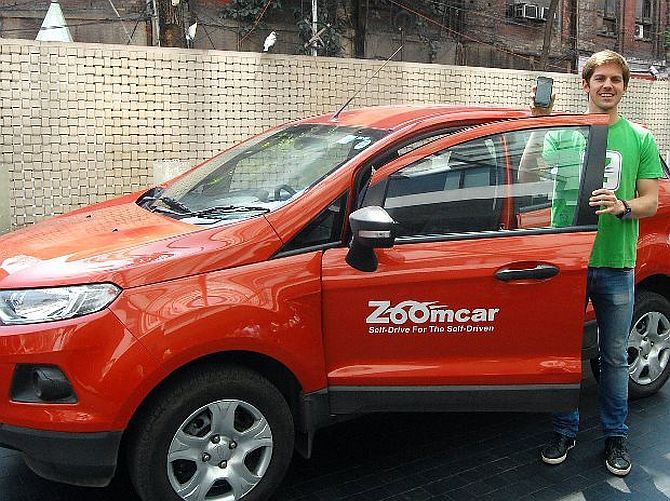The company, which rents cars by the hour, day, week and month, has Mahindra E2O Plus and Tata E Tigor available on the platform for which it charges a subscription fee of Rs 15,000-20,000 per month.

Sequoia Capital and Mahindra & Mahindra backed self-driving car rental Zoomcar is betting on the electric vehicle (EV) segment and plans to add 2,500-3,000 more EVs.
The Bengaluru-headquartered firm currently operates a fleet of 500 EVs, which it claims is growing four times year-on-year.
The company, which rents cars by the hour, day, week and month, has Mahindra E2O Plus and Tata E Tigor available on the platform for which it charges a subscription fee of Rs 15,000-20,000 per month.
It is soon planning to add new Tata Nexon to its fleet of EVs.
“Electric vehicles will continue to pick up and based on the current trends we will be close to 100 per cent electric in the next 5-6 years,” said Greg Moran (pictured), co-founder and CEO of Zoomcar.
Currently, EVs form 5 per cent of the total number of cars available on its platform while 10-15 per cent of its user base opting for these cars.
In November, Tata Power Delhi Distribution (TPDDL) tied up with Zoomcar to use its EV fleet for its daily operations and maintenance work.
The project will start off with the inclusion of 12 Zoomcar vehicles.
Ride hailing app Ola is also on an EV overdrive. It is working on an EV project called Ola Electric with a mission to bring 1 million electric vehicles on the road for everyday mobility, by 2021.
The Unicorn startup has internally given a three-year timeline to roll out the first set mass produced EVs as well as related infrastructure in association with original equipment manufacturers.
Rival Uber too has deployed 50 M&M EVs on its platform in Hyderabad with plans to rollout these in other cities as well.
The government has also been gunning for making 30 per cent vehicles on the road electric by 2030 by providing special incentives such as lower GST on EVs as compared to combustion engines and tax exemption on loans to buy such vehicles.
Even after these incentives the sales remain slow as industry reports show only 1,500 electric cars were sold for personal use in the past eight months in the country.
However, experts say the future belongs to EVs.
According to a BIS Research data the EV market is expected to witness a CAGR of 53.64 per cent during 2019-2030.
“Despite low scale of the market currently, the government is committed to set up suitable infrastructure for EVs in India and some private players are also stepping up to create the supply infrastructure,” said Aryaman Tandon, automotive industry expert at Praxis Global Alliance.
“If the industry and government work in sync to create a balance between the demand and infrastructure requirements, EVs have a bright future,” he added.
Over half a dozen electric cars are expected to debut in 2020 most of which will be able to cover a distance of 350-500 km on a single charge.
Photograph: Courtesy, Business Standard











 © 2025
© 2025